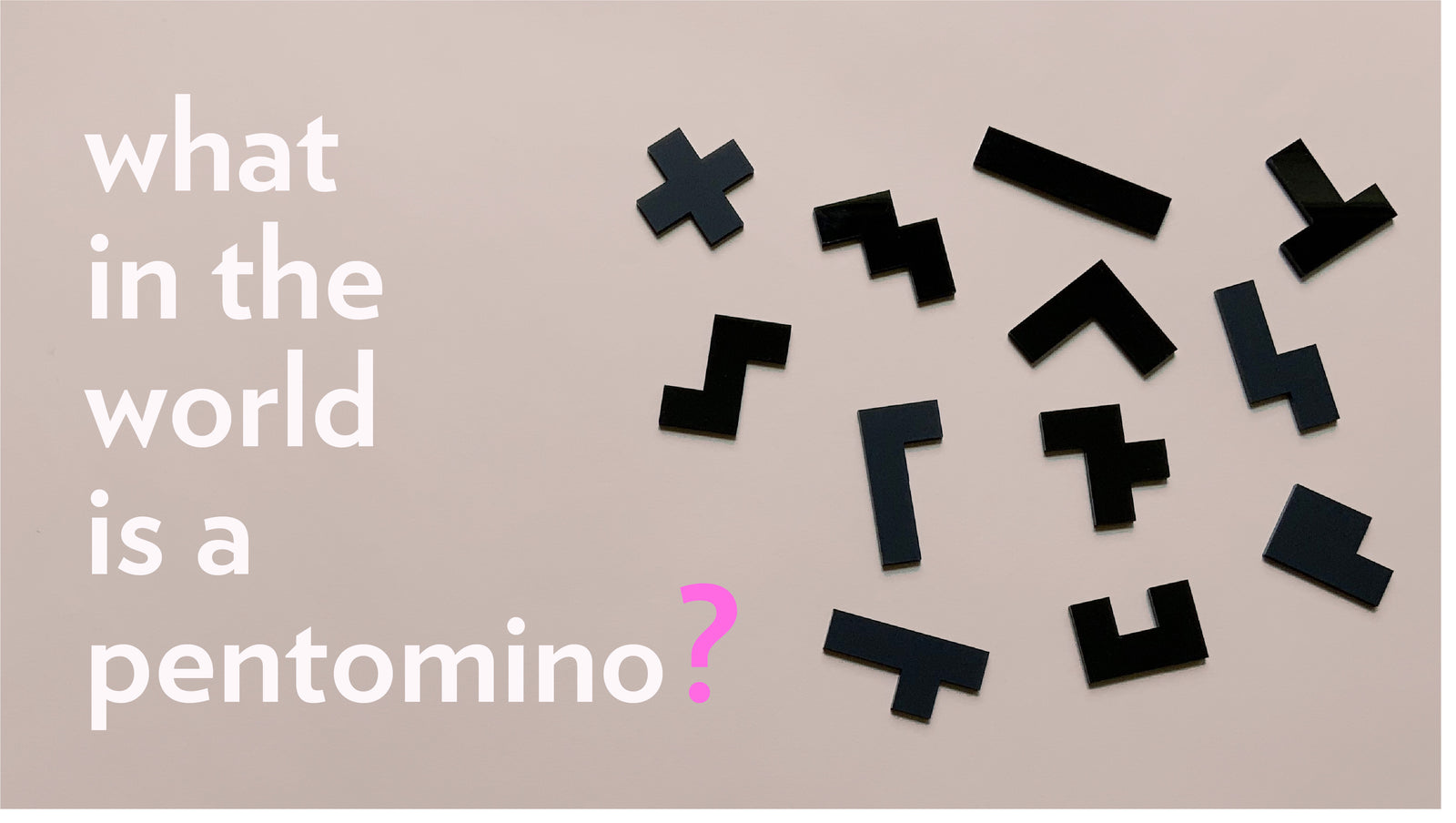Your Cart is Empty
++ FREE SHIPPING ON ORDERS OF $50 OR MORE ++
++ FREE SHIPPING ON ORDERS OF $50 OR MORE ++
++ FREE SHIPPING ON ORDERS OF $50 OR MORE ++
July 27, 2021 3 min read

We get this question a lot: what exactly is a pentomino?
Even if you’ve seen our Pentomino Puzzles, you still might be wondering. It’s totally possible to play with -- and even complete -- our Pentomino Puzzles without knowing the meaning of the term.
But the mathematical concept of the pentomino and the history behind it is actually pretty interesting, and it’s guaranteed to make you feel at least 2% smarter.
So if you’re still wondering what in tarnation a pentomino is, read on!
A pentomino is a shape formed by 5 equal-sized squares, in which the squares are attached to one another by at least one side. The word comes from a combination of “pent” meaning five, and “-omino” meaning “all together”.
It’s a lot easier to understand visually. The diagram below shows some examples of pentominoes:
As you can see, the shapes above are formed by 5 squares that are joined in different ways. There are only 12 unique possible pentominoes (without counting shapes that are identical by rotation or reflection). Each pentomino shape is identified by letters of the alphabet that they most resemble:

The earliest known pentomino puzzle was published by mathematician and famed puzzle-maker Henry Ernest Dudeny in the book Canterbury Puzzles in 1907. The illustration below accompanies the highly-amusing text of the original problem (to see the full problem in its entirety, click here).

Illustration from "The Chessboard Problem" in Canterbury Puzzles. Accessed through the Project Gutenberg eBook
The term “pentomino” became popular after Solomon W. Golomb’s 1953 talk to the Harvard Mathematics Club. It really caught on after Martin Gardner, popular writer and mathematician, published a series of puzzles involving pentominoes in his column “Mathematical Games” in Scientific America. However, the idea of the 12 distinct shapes made by five connected units has been recorded throughout history, including by an ancient master of the Chinese game Go.
Pentomino puzzles fall under the category of Recreational Mathematics. Recreational Mathematics refers to games, puzzles or activities that require the use of math skills for the participant to “win.” Martin Gardner, one of the godfathers of Recreational Mathematics, wrote this in his 1975 book “Mathematical Carnival”:
“The best way, it has always seemed to me, to make mathematics interesting to students and laymen is to approach it in a spirit of play. Surely the best way to wake up a student is to present him with an intriguing mathematical game, puzzle, magic trick, joke, paradox, model, limerick or any score of other things that dull teachers tend to avoid because they seem frivolous. The frivolity keeps the reader alert. The seriousness makes the play worthwhile. (The reader) may be surprised by the amount of nontrivial mathematics he has absorbed without even trying.”
Like Gardner suggests, pentomino puzzles really do help develop and hone visual and spatial skills, and you can have fun doing them!
At Bright Beam Goods, we make a variety of Pentomino Puzzles. Some of our favorites are shown below. In the top row are examples of our Square Pentomino Puzzles. They may look simple, but we call them “basically impossible” for a reason -- they’re tough! We also have several Animal Pentomino Puzzles in the shape of some of our favorite critters. At the "surprisingly difficult" level, they are easier than our Square Pentominoes, but still quite a challenge! To peruse our entire selection of Pentomino Puzzles, click here.

If you’re interested in learning more about pentominoes, take a look at the Sources list below! There’s a lot of extra info and theory that we couldn’t fit into this article. Happy learning!
Sources:
https://www.cimt.org.uk/resources/puzzles/pentoes/pentoint.htm
https://web.ma.utexas.edu/users/smmg/archive/1997/radin.html
https://www.andrews.edu/~calkins/math/pentos.htm
http://www.martin-gardner.org/SCIAMERICAN.html
https://isomerdesign.com/Pentomino/
Comments will be approved before showing up.